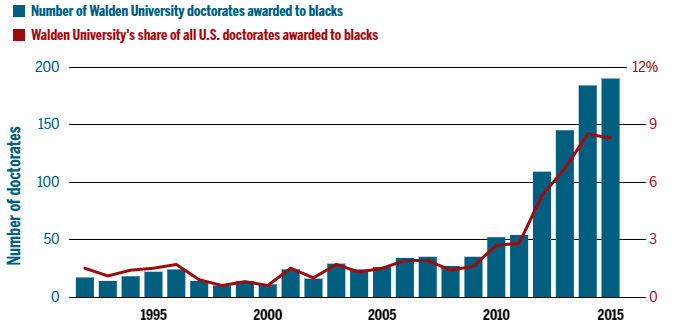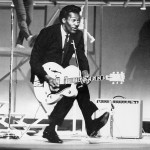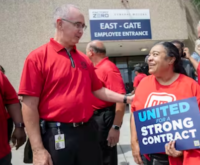By Jeffrey Mervis
Science, Feb. 17, 2017 —
An online, for-profit university is doing something that has long eluded brick-and-mortar institutions in the United States: awarding advanced degrees to significant numbers of black students.
New data from the latest Survey of Earned Doctorates by the National Science Foundation (NSF) document how Walden University, which has its academic headquarters in Minneapolis, Minnesota, is far outpacing every other U.S. university in serving this population. At the same time, Walden’s success won’t improve faculty diversity, one of the holy grails of U.S. higher education, until traditional brick-and-mortar institutions become more accepting of online degrees.

(Data) National Science Foundation
Founded in 1970, Walden ranks first by a wide margin among all U.S. universities in doctoral degrees awarded to black students, NSF reports. Its total of 682 degrees from 2011 through 2015 is nearly twice the number awarded by second-place Howard University, a historically black university in Washington, D.C. Every other university lags far behind. Walden’s 5-year total of 193 degrees, for example, is six times the number awarded by such large state institutions as the University of Illinois in Urbana, and Michigan State University in East Lansing.
Black students also make up a growing percentage of Walden’s overall enrollment, which last fall stood at 52,000. Although the university doesn’t collect racial data, NSF reports that one-third of the 562 doctoral degrees Walden awarded in 2015 went to black students. That share is more than double what it was in 2011, and triple the percentage in 1993.
Thanks to that growth, Walden now trains a significant fraction of all black students earning U.S. doctoral degrees. Its 2015 graduating class contains one-twelfth of the nation’s 2281 black recipients of doctoral degrees at U.S. universities that year. As recently as 2002, Walden trained fewer than one in 100.
Walden’s success is buried within NSF’s 2015 survey, an annual census of every U.S. doctoral recipient that contains a trove of information on this specialized workforce. But Walden is no secret to Kitty and Abdulla Warsame.
Chasing a dream
The married couple, who are both black, had already enjoyed successful careers—she as a teacher in public and private elementary and secondary schools, he as a chemical engineer for oil and gas countries around the world—when they decided separately that their next career would be as a university faculty member. Both had the same goal, namely, to share their real-world work experiences with undergraduates studying to enter those fields.

Kitty and Abdulla Warsame celebrate the Walden doctorate she earned in 2011. Courtesy of Kitty Warsame
To do that meant going back to school. However, the traditional colleges they had attended in the 1980s no longer fit into their busy lives. As adult learners with family responsibilities and full-time jobs—his involving extensive travel—the couple needed to call the shots on where, when, and how they could earn their graduate degrees.
Kitty, now 61, had become enamored with Walden while earning her master’s degree in early childhood reading and literacy more than a decade ago. “You can immediately take what you’re learning and use it in the classroom,” she says. “It was the most useful degree ever.”
That positive experience convinced her to stick with Walden for her Ed.D. in educational leadership. Her doctoral program required one 3-day residency, she recalls. The rest of the work, both courses and her dissertation, was done online.
The arrangement meshed well with her personal life. “I was teaching full time and had young children, and my husband was out of the country for his job,” she says. “I could never have done it at a traditional brick-and-mortar institution.” Walden was considerably more expensive than other online programs, Kitty notes. But she was willing to pay it for what she felt was a higher quality education.
Morehead State University in Kentucky hired her immediately after she graduated in 2009. In 2012 she was recruited into a tenure-track position by Prairie View A&M University in Texas, where she got rave student reviews and was promoted to interim chair for curriculum and instruction, the biggest department in its College of Education.
Abdulla enrolled at Walden just as Kitty was finishing her degree. Born and raised in Somalia, he had come to the University of Kentucky in 1982 to earn both his bachelor’s and master’s degrees. That’s where they met and married, and in 1992 he became a U.S. citizen.
Since then he has worked around the world—Qatar, Angola, and Equatorial Guinea—as well as in Kentucky and Houston, Texas. The demands of his job slowed his progress toward his Ed.D. But in December 2016 he was laid off, and this spring he hopes to finish his degree and, at 62, make the jump into academia.
“There’s a big gap between education and practice in engineering,” he says. “Many professors are engineers by degree but not by practice. I had one professor at Kentucky with industry experience, and he saw things from a different angle.”
Abdulla says he wouldn’t have any trouble finding another position in the energy industry. “Chemical engineers are in high demand,” he says. But he’d rather work upstream, trying to improve the quality of the engineering workforce. “I was always mentoring new employees on the job,” he says. “So now I’m hoping for a chance to do it on a larger scale, before they get their first job.”
The Warsames epitomize the type of nontraditional student that Walden serves. They tend to be older, working full-time jobs, and about 85% are pursuing graduate degrees, including a range of Ph.D.s, Ed.D.s, and professional degrees. They are also more likely to be female, come from a racial or ethnic minority, and be the first in their generation to attend college than graduate students at other U.S. institutions, according to a recent Gallup study Walden commissioned. That’s not the pedigree of the traditional academic researcher in the United States.
Some 58% of the 1135 doctoral degrees Walden awarded between 1990 and 2015 fall within NSF’s definition of science and engineering (S&E). That large number means Walden has the potential to contribute to NSF’s decades-long quest to increase participation by underrepresented minorities—Hispanics, Native Americans, and those with disabilities as well as blacks—in academic science.
The largest S&E subgroup at Walden is the social sciences and psychology, with 28% of the total. Next, at 25%, are doctoral degrees that NSF defines as the health sciences. (Only a tiny slice of Walden doctoral degrees are awarded in biology, mathematics, and the physical sciences.) Education is the largest field in the non-S&E doctoral category, comprising 19% of the total degrees awarded.
Walden’s recipe
Most of Walden’s students are practitioners. But that doesn’t mean they are getting a watered-down doctoral degree, says Irma Harper, assistant vice chancellor for the Texas A&M University system (TAMUS) in Houston. For a decade Harper was also a faculty member at Walden, and she chaired Kitty Warsame’s dissertation committee.
“An online program has to be well-organized and structured, and Walden does that very well, probably better than we do,” says Harper, who in a previous job at TAMUS oversaw distance learning for the 11-campus system, which includes Prairie View. “I think the rigor of Walden stands up to any university program in my field” of education leadership, she adds.
Self-selection may play a role in the quality of Walden’s graduate programs, Harper speculates. “It takes a certain type of student, someone who is independent and focused on what they want,” she says. “Students who need the face-to-face mentoring that a traditional program can offer don’t stay. Kitty was driven to succeed, and she excelled.”

(Data) National Science Foundation
An online program also reduces the odds that racial or demographic stereotyping will influence outcomes, says Harper, who is white. “I have no clue how many [students] were minorities, or anything else about them,” she says about the 28 students she advised but never met. She knows Kitty only because Warsame sought her out after learning they both lived in the Houston area.
Although the Walden degree gave Warsame entrée into academia, she says many of her colleagues at Morehead State were scornful of her credentials. “They had a difficult time accepting anyone with an online degree,” she says. “Anything new was seen as a threat to the status quo.” Prairie View was no better, she adds. “I think it will take a generation for attitudes to change,” she predicts.

(Graphic) David Malakoff/Science; (Data) National Science Foundation
Warsame recently left Prairie View and will soon be working as an adjunct at the University of Houston in Victoria, Texas. “I didn’t need the headache of a full-time faculty position,” she says. “And this will give me a chance to return to my first love, working with undergraduates on how to become better classroom teachers.”
Despite the hostility she faced, Warsame has no regrets about earning her degrees online. “I’m 100% confident about my ability to teach my students what they need to know,” she says.
That’s no idle boast, Harper says. “Kitty was nominated by her dean for a chancellor’s teaching award after her first year at Prairie View,” she notes. “But we couldn’t let her have it because she hadn’t been there long enough.”
Kitty credits Walden for giving her the skills she needed to succeed. And she has returned the favor by being an unpaid advocate for its brand of education.
“I love Walden, and I’ve encouraged several people to go there, including my husband,” she says. “I’m their best advertisement, and they don’t even know it.”











